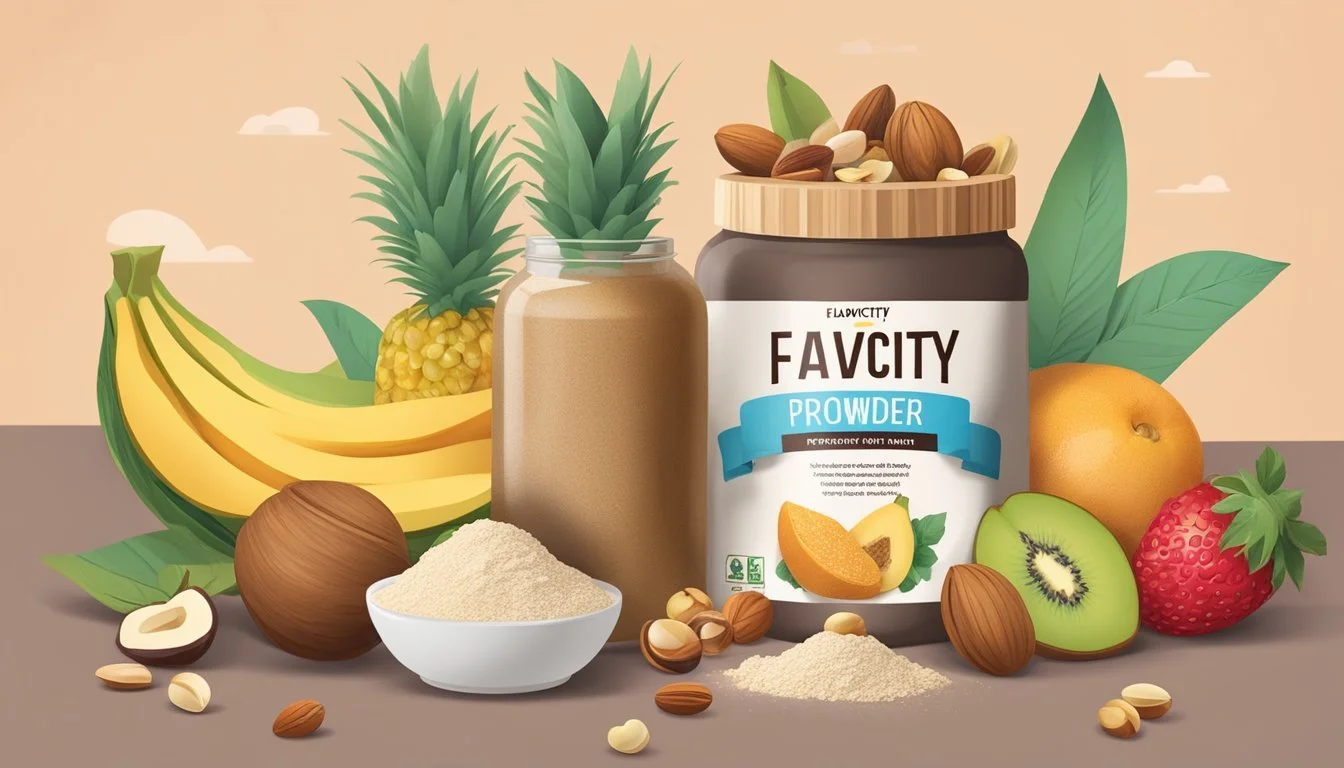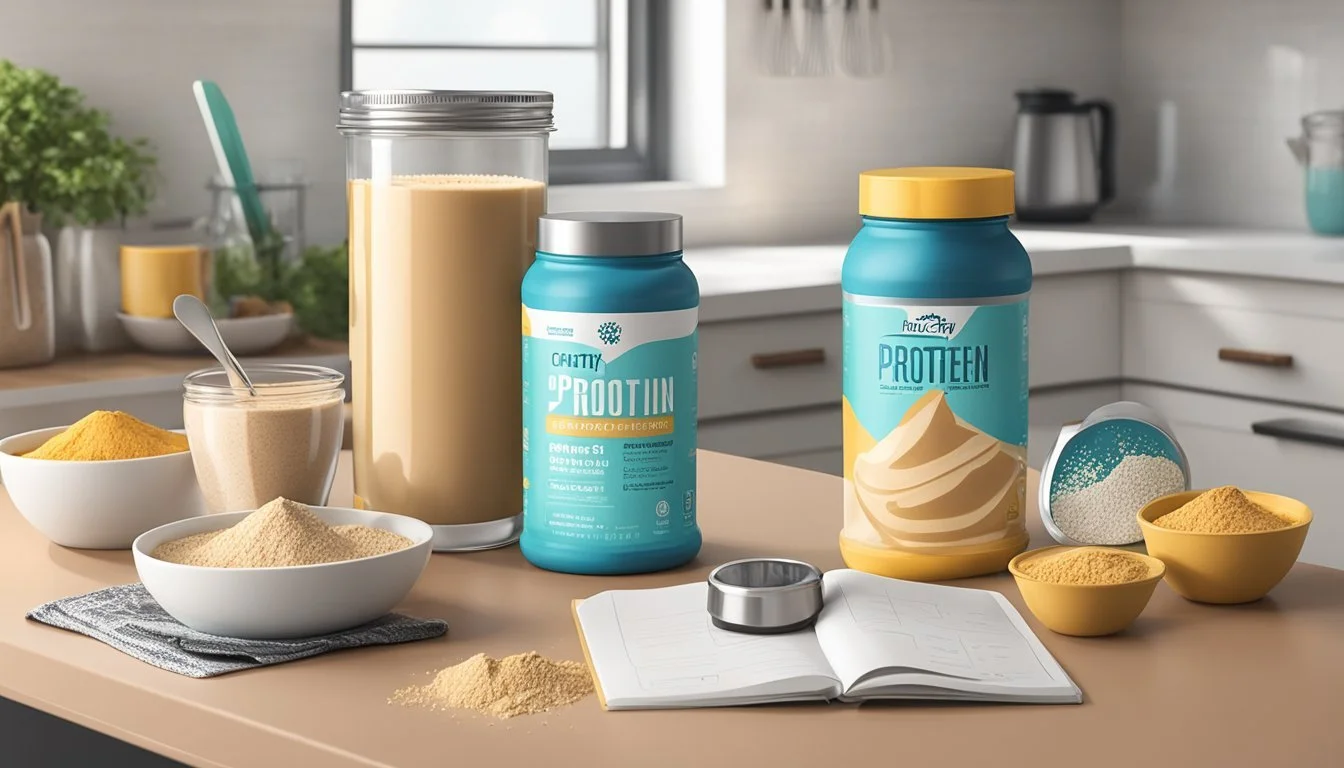How Many Servings of FlavCity Protein Powder Is Too Much
Expert Guidelines
How many servings of FlavCity Protein Powder are too much? When it comes to protein supplements like FlavCity Protein Powder, moderation is key. Experts generally recommend consuming no more than two to three servings of protein powder a day, depending on individual dietary needs and activity levels. This is in line with general guidelines suggesting around 0.8 grams of protein per kilogram of body weight per day.
FlavCity Protein Powder, available in both vegan and whey options, has gained popularity for its clean, organic ingredients and high protein content. While this makes it an attractive option for those looking to supplement their protein intake, overconsumption can lead to potential health issues such as digestive discomfort or kidney strain. Combining FlavCity with a balanced diet can help optimize overall health benefits without overloading your body with protein.
Understanding individual protein requirements is crucial for maintaining good health. For instance, a person weighing 150 pounds typically needs about 55 grams of protein daily. If this person uses FlavCity as part of their routine, it becomes easier to manage their intake. Staying mindful of how much protein one consumes from all sources ensures that protein supplements serve as a beneficial addition rather than a cause of health concerns.
Understanding Protein Powder Supplements
Protein powder supplements come in various forms and offer multiple benefits, from muscle growth to overall wellness. It's essential to understand the different types, benefits, and quality indicators to make an informed decision.
Types of Protein in Supplements
Whey Protein: Whey, a byproduct of cheese, is a popular choice due to its high biological value. It's available as whey protein concentrate, whey protein isolate, and hydrolyzed whey. Whey protein isolate is purer and has less fat and lactose than concentrate.
Pea Protein: A plant-based option made from yellow split peas. Organic pea protein is often preferred for its clean label and minimal allergen risks. It's suitable for vegans and those with dairy intolerances.
Collagen: Typically derived from animal bones and connective tissues, collagen supports joint health and skin elasticity but is not a complete protein source.
Benefits of Protein Supplementation
Consuming protein powders aids in muscle growth and recovery after workouts. Protein helps rebuild muscle fibers damaged during exercise, promoting strength and size increases.
Weight management is another benefit, as protein has a high satiety value, reducing hunger and aiding in muscle-to-fat ratio improvement. For those looking to improve overall wellness, protein supplements can fill dietary gaps, ensuring adequate daily protein intake.
Vegan protein powders are advantageous for those avoiding animal products, offering a plant-based source of nutrients without common allergens.
Evaluating the Quality of Protein Powders
When assessing protein powders, consider the source and form. Grass-fed whey protein indicates higher quality, with more omega-3 fatty acids and no artificial additives.
Check for third-party lab testing to ensure a clean label free of contaminants like heavy metals (e.g., lead).
The amino acid profile is crucial; a complete protein contains all essential amino acids needed for muscle repair and growth.
Organic pea protein and other organically certified supplements often meet strict quality standards, providing additional peace of mind.
When choosing, balance cost with quality. While some options are more expensive per serving, like certain whey isolates, they may offer better grade and absorption.
Always consult with a healthcare provider to determine the best protein supplement for personal needs and dietary restrictions.
Proper Usage of Flavcity Protein Powder
Understanding the recommended intake and proper incorporation of Flavcity Protein Powder into daily routines ensures optimal health benefits. This section covers dietary allowances, methods to determine individual protein needs, and ways to include the powder in one’s diet.
Recommended Dietary Allowance for Protein
The Recommended Dietary Allowance (RDA) for protein varies based on factors like age, sex, and activity level. For adults, the general RDA is set at 0.8 grams of protein per kilogram of body weight.
Active individuals and those looking to build muscle mass may require higher protein intake, typically around 1.2 to 2.0 grams per kilogram of body weight. It’s essential to adjust intake based on personal health goals and lifestyle.
How to Determine Your Protein Needs
Calculating individual protein needs involves considering multiple factors such as current body weight, activity intensity, and overall health goals. For example, a sedentary adult weighing 70 kilograms would need around 56 grams of protein daily (70 kg * 0.8g/kg).
For those engaged in intense physical activities or aiming for muscle gain, protein requirements may rise. Tools such as a protein calculator or consultation with a nutritionist can help tailor specific needs.
Incorporating Protein Powder into Your Diet
Integrating Flavcity Protein Powder into one’s diet can be seamless with a bit of planning. This versatile powder can be added to smoothies, protein shakes, and meal replacement recipes. Each serving of Flavcity offers a blend of different protein types, supporting muscle recovery and growth.
Start by adding one scoop to breakfast smoothies or post-workout shakes. For variety, mix it into oatmeal, pancakes, or baked goods. Adherence to serving recommendations and the RDA ensures balanced supplementation without excess intake.
Adapting these practices can assist in maintaining a balanced diet while optimizing protein intake to support overall health goals.
Potential Risks and Side Effects
Excessive consumption of Flavcity Protein Powder can lead to various health issues. Understanding the balance needed in a high-protein diet and being aware of the specific ingredients in the powder can help mitigate these risks.
Recognizing the Signs of Excessive Protein Intake
Consuming too much protein can lead to several health complications, especially if maintained over a prolonged period. Dehydration is common, as the kidneys need more water to process the extra protein. Symptoms might include frequent urination and a constant thirst.
Kidney and liver stress are potential risks. When the body metabolizes protein, it generates nitrogen waste which must be filtered by the kidneys. This additional burden can aggravate existing kidney conditions and may lead to kidney disease.
Weight gain can occur if the protein powder contains significant added sugars or if the total calorie intake exceeds daily requirements. Monitoring for early signs of excessive protein intake, such as bloating, gas, and lethargy can preclude more serious issues.
Side Effects Associated with Protein Ingredients
Flavcity Protein Powder blends various protein sources, such as whey, milk protein isolate, and egg white albumin. For some individuals, these ingredients can trigger allergies or intolerances. Those allergic to dairy might experience symptoms like bloating, gas, and digestive upset from whey and milk proteins.
Micellar casein can also be heavy on the digestive system, leading to discomfort if taken in large quantities. Egg white albumin is generally easier to digest but can still cause issues for those with specific allergies or intolerances.
Moreover, individuals following specific dietary restrictions (dairy-free, soy-free, gluten-free) should carefully check if the product meets their requirements to avoid unintended side effects.
Controversial Ingredients and Additives
Protein powders often contain additional ingredients to enhance flavor or texture. Artificial flavors might appeal to the palate but can sometimes lead to adverse reactions in sensitive individuals. Natural sweeteners like stevia and sucralose are popular, but they may cause digestive issues for some people.
Flavcity Protein Powder includes added sugars, impacting those monitoring sugar intake for heart disease or weight management. Flavors such as salted caramel or fruity cereal flavor might have higher sugar content, contributing to an unhealthy spike in blood sugar and potential weight gain.
Additionally, some protein powders might contain controversial ingredients that are less beneficial or whose long-term impact is unclear, so scrutinizing the label for such components is prudent.
Making the Most of Your Protein Powder
Flavcity Protein Powder is a versatile tool for anyone looking to enhance their nutrition. By incorporating it creatively and understanding when and how to consume it, users can maximize benefits for muscle recovery and overall health.
Creative Ways to Use Protein Powder
Protein powder is not just for shakes. Athletes and health enthusiasts can mix it into smoothies, pancakes, and even baking recipes like muffins and cookies. Its ability to blend seamlessly without a blender makes it convenient for on-the-go nutrition.
Using Flavcity in meal replacements like shakes can provide a nutritious option with no added sugar, ideally for busy days. Incorporating protein powder in different foods helps vary the diet, making it easier to meet daily protein requirements without monotony.
Optimizing Protein Absorption and Effectiveness
To get the most out of protein powder, timing is crucial. Consuming it within 30 minutes after physical activity helps in muscle recovery. Combining it with carbohydrates post-workout can enhance protein absorption, as insulin surges help amino acids enter muscles more efficiently.
Spreading protein intake throughout the day is effective, with each serving contributing consistently towards daily goals. Drinking 2-3 servings spaced out can prevent overconsumption and potential digestive issues. Adjusting intake based on individual needs, age, sex, and activity levels ensures effective use without wastage.
Special Considerations for Athletes and Active Individuals
Athletes and active individuals have unique nutritional needs that should be taken into account when using Flavcity Protein Powder. Key considerations include the specific protein requirements for muscle maintenance and growth, as well as balancing macronutrients to optimize performance.
Protein Needs for Muscle Maintenance and Growth
Active individuals and athletes require higher protein intake compared to sedentary persons. This increased need is due to the demands of muscle repair and growth triggered by strenuous physical activity.
Typical recommendations suggest consuming about 1.2 to 2.0 grams of protein per kilogram of body weight per day. For example, an athlete weighing 70 kg might need anywhere from 84 to 140 grams of protein daily to support muscle recovery and growth.
Using Flavcity Protein Powder can help meet these needs efficiently. Each serving of the powder provides a substantial amount of protein, often sourced from high-quality ingredients like grass-fed whey and collagen. This helps not just in muscle building but also in joint support, which is crucial for maintaining peak physical condition.
Balancing Macronutrients for Optimal Performance
Consuming the right balance of macronutrients—protein, carbs, and fats—is essential for overall performance and recovery. While protein is crucial for muscle repair, carbohydrates and fats play vital roles as well.
Carbohydrates act as the primary energy source for high-intensity activities. Athletes should ensure they are getting enough carbs to maintain energy levels and prevent muscle breakdown. Fiber-rich carbs are recommended for sustained energy release.
Fats also provide essential fatty acids and assist in the absorption of fat-soluble vitamins. Balancing these macronutrients alongside protein from sources like Flavcity Protein Powder ensures comprehensive nutritional support. This balance aids in maintaining energy levels, optimizing muscle function, and facilitating quicker recovery.
Answers to Common Concerns About Protein Powder
Understanding the limitations and benefits of protein powder can help users make informed choices about their diet. This section addresses key concerns related to protein powder consumption.
Is There a 'Too Much' When It Comes to Protein Powder?
Consuming too much protein powder can lead to several issues. The Recommended Dietary Allowance (RDA) for protein is 46 grams per day for women and 56 grams per day for men. While athletes or individuals with higher physical activity may require more, it's important to balance intake.
Excessive protein can strain the kidneys over time and may lead to digestive issues like bloating or diarrhea. It's critical to factor in protein from all sources—whole foods and supplements. Monitoring the total daily intake ensures it aligns with individual health needs and fitness goals.
Can Protein Powder Replace Whole Food Sources?
Protein powder can serve as a convenient meal replacement, especially for individuals with busy schedules. For instance, Flavcity Protein Powder offers 200 calories and 14 grams of net carbs per serving, making it a viable option for quick meals.
However, whole foods provide a broader range of nutrients that protein powders lack. Whole foods like lean meat, fish, eggs, and legumes supply vitamins, minerals, and fiber. A balanced diet incorporating both protein powder and nutrient-dense whole foods ensures optimal nutrition and health benefits.
Balancing protein powder with whole foods maintains a diverse nutrient profile and supports overall well-being.
Choosing a Protein Powder That's Right for You
Selecting the ideal protein powder requires understanding your dietary needs and preferences, decoding nutritional labels, and considering the taste and texture to ensure enjoyment and adherence to your health goals.
Assessing Dietary Restrictions and Preferences
When choosing a protein powder, it's crucial to consider any dietary restrictions or preferences.
For Vegans: Vegan options like organic plant-based proteins or organic pea proteins are excellent choices. They avoid animal products while providing essential nutrients.
For Low-Carb Diets: Opt for low-carb protein powders, such as those suitable for keto and paleo diets, to maintain your carbohydrate intake within desired limits.
For Allergies: If you have food allergies, such as those to dairy or soy, look for clean label products that clearly list all ingredients. There are numerous options available that are free from common allergens.
Decoding Protein Powder Labels
Understanding protein powder labels is vital for making an informed choice.
Look for:
Protein Content: Aim for at least 20 grams of protein per 100 calories.
Natural Sweeteners: Choose powders with natural sweeteners like stevia instead of artificial ones.
No Added Sugar: Products without added sugars help maintain a healthy diet.
Nutritional Additives: Check for additional nutrients like vitamins, minerals, or probiotics that can enhance the health benefits of your protein powder.
Review the ingredient list for transparency and to ensure that the product aligns with your dietary goals.
The Role of Taste and Texture in Your Choice
Taste and texture play significant roles in your protein powder experience.
Flavor Options: Look for delicious flavors that you enjoy, such as fruity cereal or salted caramel, to make your shakes or recipes more appealing.
Texture: Consider if the protein powder blends well in liquids or recipes. Some people prefer a smooth texture, while others might enjoy a bit of graininess.
Consistent Enjoyment: The more you enjoy the taste and texture, the more likely you are to consistently use the protein powder, which helps in meeting your health and fitness goals.
Choosing a protein powder that you find tasty and satisfying can significantly enhance your overall dietary experience.
Expert Opinions and Brand Analysis
Industry experts and brand analyses offer essential insights into the proper serving sizes of protein powders, as well as comparisons between popular brands.
Reviewing Expert Recommendations
Experts in sports nutrition, such as dietitians and trainers, often emphasize the importance of moderation. They suggest that consuming more than 2-3 servings of protein powder daily could lead to unnecessary calorie intake and potential digestive issues.
Bobby Parrish, a well-known figure in the protein powder community, echoes these sentiments. His brand, FlavCity, recommends sticking to the recommended serving size on the product label. This usually aligns with the 25-30 grams per serving widely advised by nutritional experts.
For vegan or plant-based proteins like Truvani Vegan Protein Powder, experts often highlight the need for consuming a balanced variety to ensure a complete amino acid profile. They suggest not exceeding three servings a day to avoid overwhelming the digestive system with high fiber content.
Comparative Analysis of Popular Brands
In comparison, brands like Optimum Nutrition and Dymatize provide serving sizes that align closely with industry norms: around 24 grams of protein per serving. Optimum Nutrition’s whey protein is priced at approximately $1.50 per serving, making it more affordable than FlavCity, which costs around $3.00 per serving.
Equip Foods Prime Protein offers a blend that supports both muscle recovery and meal replacement. With a focus on all-natural ingredients, it competes well in quality but at a higher price point.
FlavCity Protein Powder combines five different protein types, making it versatile but expensive. It offers 20 grams of protein per serving and is praised for its balanced amino acid profile. However, its high cost per serving and mix of proteins make it most suitable for those looking for a diverse protein source.
By analyzing expert recommendations and comparing various brands, consumers can make informed decisions about their protein intake.










